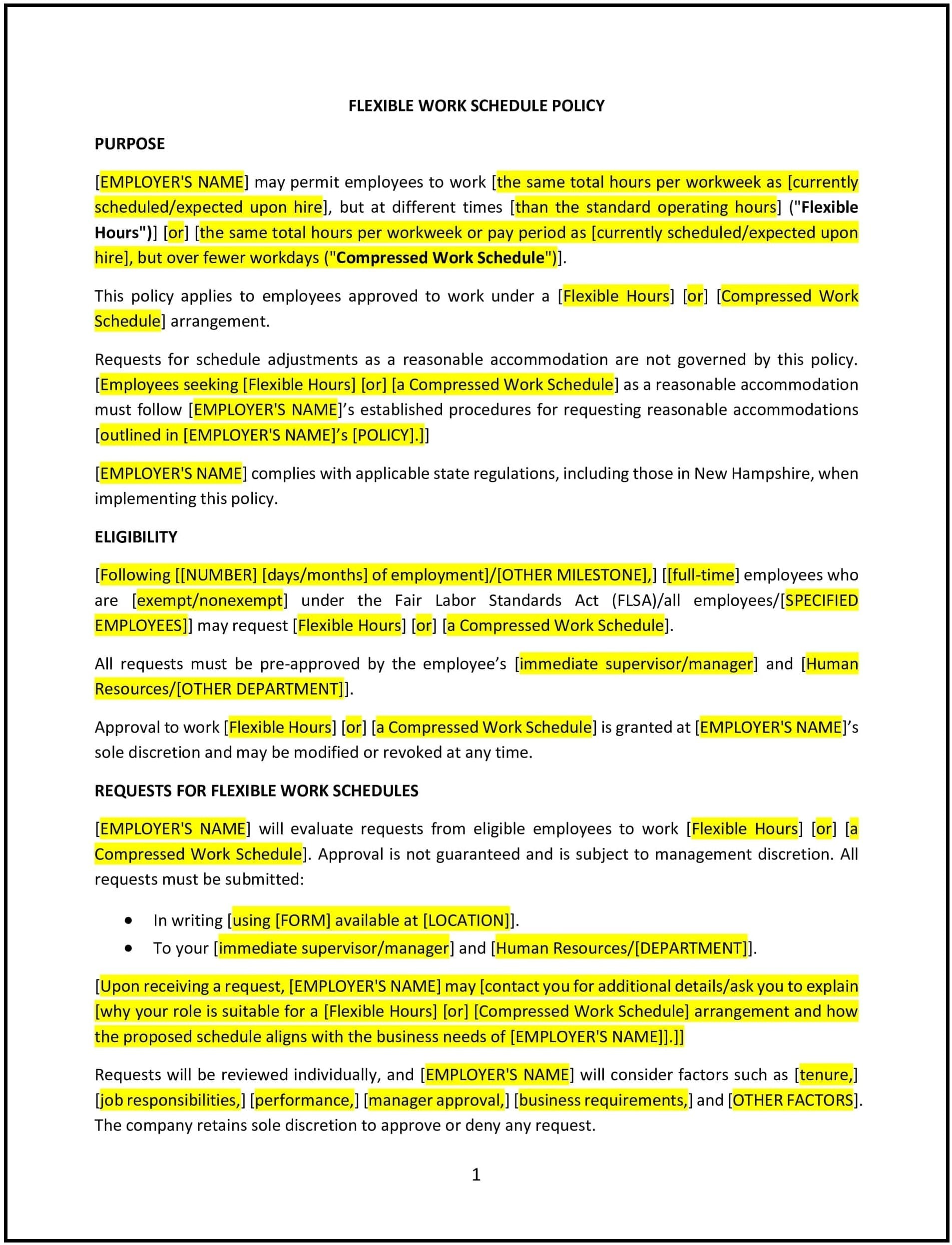Flexible work schedule policy (New Hampshire): Free template
Got contracts to review? While you're here for policies, let Cobrief make contract review effortless—start your free review now.

Customize this template for free
Flexible work schedule policy (New Hampshire)
A flexible work schedule policy helps New Hampshire businesses offer employees more control over their work hours and locations. This policy outlines the guidelines for implementing flexible work arrangements, such as staggered hours, compressed work weeks, or remote work options, to promote work-life balance, improve productivity, and support employee retention.
By adopting this policy, businesses in New Hampshire can accommodate diverse employee needs, attract top talent, and enhance overall job satisfaction while maintaining operational efficiency.
How to use this flexible work schedule policy (New Hampshire)
- Define flexible work arrangements: Clearly explain the types of flexible work arrangements available, such as flexible hours, telecommuting, compressed work weeks, or part-time schedules.
- Set eligibility criteria: Specify which employees are eligible for flexible work schedules, such as full-time employees with a certain tenure, or those in specific job roles.
- Outline approval process: Establish a clear process for requesting a flexible work schedule, including how employees should submit requests, what information is required, and how long the approval process takes.
- Establish performance expectations: Define performance standards for employees on flexible schedules, ensuring that job responsibilities, productivity, and deadlines are still met.
- Determine communication protocols: Set expectations for how employees on flexible work schedules should communicate with their managers and colleagues, including availability hours, check-ins, and reporting.
- Provide guidelines for remote work: If remote work is an option, specify the terms of remote work arrangements, including the use of company equipment, security protocols, and communication tools.
- Address work-life balance: Encourage employees to set boundaries between work and personal life and outline the company's support for maintaining a healthy balance.
- Review and update: Regularly review and update the policy to reflect changes in New Hampshire regulations, business needs, or employee feedback regarding flexible work arrangements.
Benefits of using this flexible work schedule policy (New Hampshire)
This policy provides several benefits for New Hampshire businesses:
- Increases employee satisfaction: Flexible work schedules help employees balance personal and professional responsibilities, leading to higher job satisfaction and morale.
- Enhances productivity: Employees often work more efficiently when they have control over their schedules, leading to increased productivity and reduced absenteeism.
- Attracts top talent: Offering flexible work options makes a business more attractive to potential employees, particularly those seeking better work-life balance or those with caregiving responsibilities.
- Reduces turnover: By providing employees with flexibility, businesses can improve retention and reduce the costs associated with high turnover rates.
- Improves diversity and inclusion: Flexible work schedules can help support diverse employees, including those with disabilities, parents, or caregivers, by offering them more control over their work environment and hours.
Tips for using this flexible work schedule policy (New Hampshire)
- Communicate the policy clearly: Ensure that employees understand the types of flexible work arrangements available, how to request them, and the expectations associated with such arrangements.
- Provide training for managers: Train managers on how to manage employees on flexible schedules, including how to assess performance, maintain communication, and ensure productivity.
- Track performance: Use performance metrics to monitor the productivity of employees working flexible schedules and ensure that job responsibilities are being met.
- Be adaptable: Regularly assess the effectiveness of flexible work arrangements and be open to adjusting the policy as needed based on employee feedback and business requirements.
- Stay compliant with state laws: Keep the policy up to date with any changes in New Hampshire labor laws or regulations regarding flexible work arrangements.